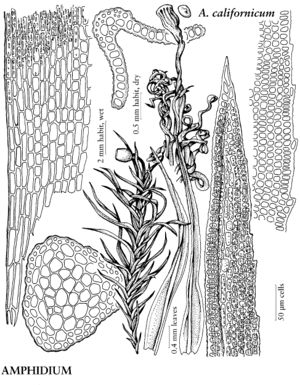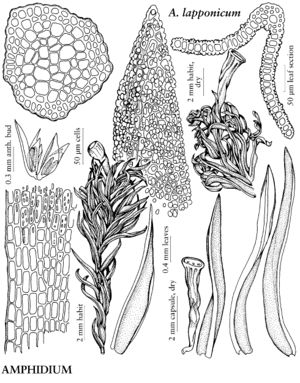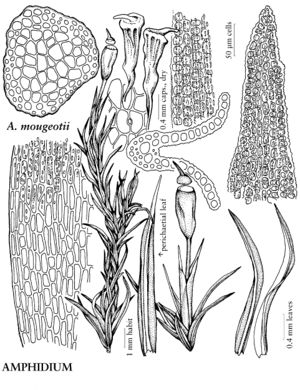Amphidium
Coroll. Bryol. Eur., 39. 1856.
| Taxon | Illustrator ⠉ | |
|---|---|---|
 | Amphidium californicum | Patricia M. Eckel |
 | Amphidium lapponicum | Patricia M. Eckel |
 | Amphidium mougeotii | Patricia M. Eckel |
Plants small, in dense cushions. Stems erect, branches ascending. Leaves twisted and contorted when dry, spreading when moist, linear to narrowly lanceolate, not rugose; margins entire or toothed; apex acute; costa percurrent or short-excurrent; basal laminal cells rectangular; distal cells rounded, 5–11 µm, papillose over lumina and transverse walls, papillae cuticular; marginal cells not much different from basal. Sexual condition autoicous or dioicous; perichaetial leaves larger than stem-leaves. Seta 1–3.5 mm. Capsule mostly emergent to immersed, oblong, 8-ribbed, constricted below mouth; stomata superficial; peristome absent. Calyptra cucullate, smooth, naked, not plicate, covering 1/2 capsule. Spores isosporous.
Distribution
North America, Mexico, Central America, South America, Europe, Asia, Africa, Pacific Islands, Australia
Discussion
Species 12 (3 in the flora).
Amphidium forms limey green cushions in seepages of non-calcareous rock. The basal laminal cells are smooth. The absence of peristome has led to considerable discussion of the placement of the genus. J. Lewinsky (1976) suggested placement in Orthotrichaceae, while D. H. Vitt (1973) proposed Rhabdoweisiaceae Limpricht. Although Amphidium is treated here in Orthotrichaceae, recent DNA evidence indicates closer relationships with Haplolepideae [unranked] (B. Goffinet et al. 1998) and Rhabdoweisiaceae (M. Stech 1999b).
Selected References
None.
Key
| 1 | Leaf margins toothed or notched distally. | Amphidium californicum |
| 1 | Leaf margins entire | > 2 |
| 2 | Sexual condition autoicous; leaves ligulate-lanceolate; distal laminal cells 8-11 µm, obscured by papillae, papillae relatively large, warty; operculum short-rostrate, less than diam. of capsule; capsules immersed to 1/2 emergent. | Amphidium lapponicum |
| 2 | Sexual condition dioicous; leaves linear-lanceolate; distal laminal cells 5-9 µm, slightly obscured by papillae, papillae small, elliptic; operculum rostrate, greater than diam. of capsule; capsules barely exserted. | Amphidium mougeotii |